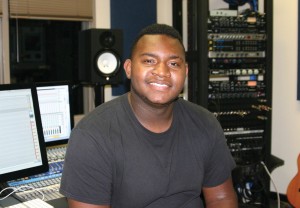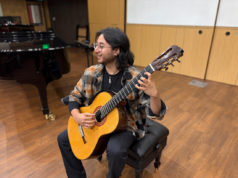The mélange of music programs has stretched beyond Southwest’s walls. Adam Kramer is band director at nearby Wedgwood Middle School, and he brings students to Southwest every day for jazz band rehearsal. Band directors often have expertise in horns, woodwinds, and percussion but are less familiar with the basic rock components of guitar, keyboard, bass, and drums.
“With [Petrilli], he’ll find kids that aren’t anywhere associated with band, but they’re in here, and they have these mad skills,” Kramer said. “He develops them in CAM and sends them over to me. He is supplying me with rhythm-section kids who are great.”

Jarius Foster is a prime example of how the pieces fit together. Foster played saxophone in middle school but not well. Put him on a piano or bass, however, and he shines.
“We kept telling him, ‘Just wait until 9th grade, and you can do piano or bass in the jazz band,’ ” Kramer said. “The crossover we can do with the CAM academy is definitely unique in Fort Worth and pretty unique, period.”
Kramer taught Foster to read music, and now the senior plays in marching band, jazz band, and a contemporary band, and he has recorded an album of gospel music. And he plays piano regularly at his church.
“That creates a super well-rounded musician,” Kramer said.
The stocky, muscular Foster once harbored dreams of playing college football. But he tore a knee ligament at Southwest, and while he recuperated he spent more time playing piano. He realized his heart beat for music, not sports. Eventually he wants to score films. CAM helped him learn to use Mac computers and the music software he’ll need to know in the future.
“Without this program I would have had to teach myself, and it would have taken me a longer time,” he said.
Foster is seeking scholarships and sees a role model in Luis Moreno, who graduated from Southwest last year. Moreno was an all-state tuba player in the marching band, and he also played in jazz, concert, and CAM bands. He’s pursuing a musical degree at UTA with the help of music and academic scholarships.
“I got $4,000 a year for my tuba, $2,000 a year for my jazz bass playing, and about $5,000 more for my academics,” he said. “I just have maybe $2,000 that I’m using a loan for, but all the tuition is paid.”
Eventually he’d like to play in a professional symphony. Or maybe his rock band, Black Market Garden, might take off. Or maybe he’ll teach music for a living.
“Hopefully, I’m playing somewhere,” he said.
Maybe you’re reading this and thinking, “What in tarnation are kids learning in schools nowadays? Where’s the math, science, English, history?!”
Students must pass those subjects before they’re allowed to participate in the music programs.
Or maybe you’re thinking, “Why can’t those damned kids play their loud music at home? Why are taxpayers footing the bill?”
If a kid wants to make music his life, it makes sense for a high school to teach aspects of that career. The district’s gold seal program was designed to create specialized curricula that offer “private school” focus at public school costs.
“Look throughout human history,” Kramer said. “Music is right there playing an important role. Go back as far as you can in recorded history, there are people drumming. The bible has trumpets in it. Music is as old as we are. I don’t teach music because it makes kids better at math. I teach music because it makes kids better as people. It just enriches the human experience.”

Follow Jeff @jeffroprince












Thanks Fort Worth Weekly and Jeff Prince for helping spread the word about our music program.
Thanks for this awesome article, Mr. Prince! Getting the word out about these offerings helps us a lot.
The band, the Southwest Contemporary Academy, and teachers Stacey Dunn and Marco Petrilli deserve it. We also have an incredible choir and a huge orchestra.
This is great! I love how the southwest music program is being recognized!
Great article about great people and music. Really enjoyed reading this article. #LuisMoreno
Jeff, this is a wonderful story!
Our music program is wonderful and filled with a variance of creative outlets for students this is why im proud to be a student of the Cam program
Foat Wuff…….I love you!!!
great article
very good article southwest music is fantastic
Favorite course at Southwest High School1